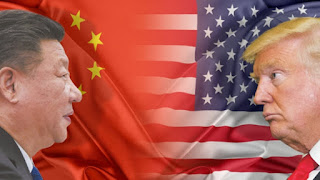 |
| Source: Tehrantimes.com |
Many of us associate war with weapons and military. But in a trade war, the product you use every day is the weapon. Be it your electronic devices, vehicles, clothing, food, and many more. The Trump Administration said the tariffs were necessary to protect national security and the intellectual property of U.S. businesses, and to help reduce the U.S. trade deficit with China.[4] China is also accused of being unfair due to manipulation of its currency, Yuan and heavily subsidizing certain industries that violates the rules of World Trade Organization (WTO).
Despite its righteous aim, the tariff imposed undeniably creates ripple effects in the economy. Imported goods are essential to fulfill society demand. By imposing tariffs, the price of imported goods rises. In the United States, poorer consumers have high demand for low-cost Chinese goods. The scientists have documented that there are tendencies for tariffs to be imposed on low-end products which play a disproportionate role in the spending of poorer consumers. Poorer consumers have to spend more on basic needs that it reduces their spending on other goods and services.
Manufactured goods also object to trade war. The tariffs will hurt the industries that import materials that are taxed. It is economically beneficial for them to find domestic sources of materials, but in most cases it is not possible. As a result, the production cost increases and the price of the manufactured goods rises. Consumers will reduce their consumption. Since their profitability reduces, their only other choice is to reduce production and slash jobs. By these effects, the pace of economy will be hampered. Consultant Oxford Economics predicted the trade war could cost the global economy $800 billion in reduced trade. That is slowing down the economic growth by 0.4 percent.[5]
The Trump protectionism policy is controversial because of its unpredictability. Tariffs are in effect against goods and raw materials from countries such as China, EU, Turkey, Russia, Mexico, Canada – the list goes on. These tariffs have ruined the stability of international trade. It has forced countries to rely merely on its domestic trade. Countries involved in trade war tend to reduce its imports, later its exports due to retaliation tariffs. Moreover, it reduces the industry’s global competitiveness. Although benefiting the local industry, the product it produced would decline in quality compared to foreign-made.
In conclusion, the trade war has worsened the economy for many consumers and industries relying on foreign-trade. In United States alone, many companies have moved its production base abroad to avoid tariffs. Not to mention several layoffs due to loss of market in countries which retaliation tariffs are being applied. In a larger scope, it is harming the dynamics of international trade because it is promoting exclusivity when we should promote global partnership. If Trump really want to punish China, Trade War is not the solution.
[1] Lynch, David J. "Trump imposes tariffs on closest allies; Mexico and Europe announce retaliation". Chicago Tribune. Retrieved August 31, 2018.
[2] Update: U.S. Names Products Targeted by $200 Billion in New Tariffs - Caixin Global". www.caixinglobal.com. Retrieved August 31, 2018.
[3] "Statement from President Donald J. Trump on Additional Proposed Section 301 Remedies". White House. Retrieved August 31, 2018.[4] Diamond, Jeremy. "Trump hits China with tariffs, heightening concerns of global trade war". CNN.
Retrieved August 31, 2018.[5] Franck, Thomas. “What a full out trade war would cost the global economy”. CNBC Economy.
Retrieved September 1, 2018
[2] Update: U.S. Names Products Targeted by $200 Billion in New Tariffs - Caixin Global". www.caixinglobal.com. Retrieved August 31, 2018.
[3] "Statement from President Donald J. Trump on Additional Proposed Section 301 Remedies". White House. Retrieved August 31, 2018.[4] Diamond, Jeremy. "Trump hits China with tariffs, heightening concerns of global trade war". CNN.
Retrieved August 31, 2018.[5] Franck, Thomas. “What a full out trade war would cost the global economy”. CNBC Economy.
Retrieved September 1, 2018

Tidak ada komentar:
Posting Komentar
Berkomentarlah yang bijak :)